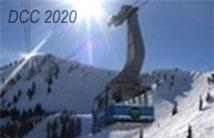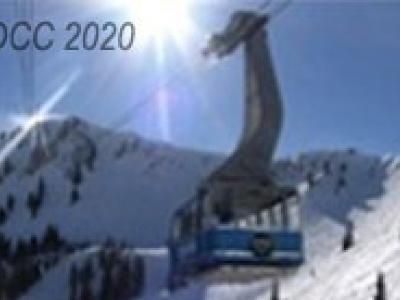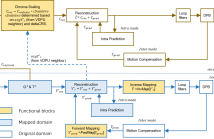
The Data Compression Conference (DCC) is an international forum for current work on data compression and related applications. Both theoretical and experimental work are of interest. Visit website.

- Read more about Gradient-based Early Termination of CU Partition in VVC Intra Coding
- Log in to post comments
- Categories:
 94 Views
94 Views
The goal of grammar compression is to construct a small sized context free grammar which uniquely generates the input text data. Among grammar compression methods, RePair is known for its good practical compression performance. MR-RePair was recently proposed as an improvement to RePair for constructing small-sized context free grammar for repetitive text data. However, a compact encoding scheme has not been discussed for MR-RePair. We propose a practical encoding method for MR-RePair and show its effectiveness through comparative experiments.
- Categories:
 41 Views
41 Views
- Read more about Towards Better Compressed Representations
- Log in to post comments
We introduce the problem of computing a parsing where each phrase is of length at most m and which minimizes the zeroth order entropy of parsing. Based on the recent theoretical results we devise a heuristic for this problem. The solution has straightforward application in succinct text representations and gives practical improvements. Moreover the proposed heuristic yields structure which size can be bounded both by |S|H_{m-1}(S) and by |S|/m(H_0(S) + ... + H_{m-1}(S)),where H_{k}(S) is the k-th order empirical entropy of S.
poster_dcc.pdf
- Categories:
 39 Views
39 Views
- Read more about Compressive Classification via Deep Learning using Single-pixel Measurements
- Log in to post comments
Single-pixel camera (SPC) captures encoded projections of the scene in a unique detector such that the number of compressive projections is lower than the size of the image. Traditionally, classification is not performed in the compressive domain because it is necessary to recover the underlying image before to classification. Based on the success of Deep Learning (DL) in classification approaches, this paper proposes to classify images using compressive measurements of SPC.
- Categories:
 63 Views
63 Views
- Read more about Video denoising for the hierarchical coding structure in video coding
- Log in to post comments
In modern video codecs, video frames are coded out-of-order following a hierarchical coding structure. The naive uniform video denoising, where denoising is applied indifferently to each frame, does not improve the compression performance. In our work, we only apply denoising to frames at layer 0 and 1. The denoising leads to a significant reduction of bit rates while maintaining temporal correlation. PSNR scores of the filtered frames decrease but PSNR scores of the unfiltered frames remain or even improve.
- Categories:
 74 Views
74 Views
This paper describes a new video coding tool in the Versatile Video Coding standard (VVC) named as luma mapping with chroma scaling (LMCS). Experimental compression performance results for LMCS and non-normative examples for deriving LMCS parameter values are also provided. LMCS has two main components: 1) a process for mapping input luma code values to a new set of code values for use inside the coding loop; and 2) a luma-dependent process for scaling chroma residue values.
- Categories:
 512 Views
512 Views
- Read more about An Adaptive Quantization Based PVC Scheme for HEVC
- Log in to post comments
In order to achieve highly compact representation for videos, we propose an adaptive quantization based perceptual video coding (PVC) scheme in this paper. Because human only perceive the limited discrete-scale quality levels, the perceptual quantization is transformed into the problem of how to determine the maximum quantization parameter (Qp) under the same perceptual quality level. So, the relationship between perceptual quality level and quantization parameter is analyzed with the statistical way in this paper.
- Categories:
 37 Views
37 Views- Read more about Lossless Multi-Component Image Compression based on Integer Wavelet Coefficient Prediction using Convolutional Neural Networks
- Log in to post comments
- Categories:
 57 Views
57 Views
- Read more about Edge minimization in de Bruijn graphs
- 1 comment
- Log in to post comments
This paper introduces the de Bruijn graph edge minimization problem, which is related to the compression of de Bruijn graphs: find the order-k de Bruijn graph with minimum edge count among all orders. We describe an efficient algorithm that solves this problem. Since the edge minimization problem is connected to the BWT compression technique called "tunneling", the paper also describes a way to minimize the length of a tunneled BWT in such a way that useful properties for sequence analysis are preserved.
- Categories:
 142 Views
142 Views
- Read more about Weighted Adaptive Huffman Coding
- 1 comment
- Log in to post comments
Huffman coding is known to be optimal in case the alphabet is known in advance, the set of codewords is fixed and each codeword consists of an integral number of bits. If one of these conditions is violated, optimality is not guaranteed.
In the {\it dynamic\/} variant of Huffman coding the encoder and decoder maintain identical copies of the model; at each position, the model consists of the frequencies of the elements processed so far.
- Categories:
 126 Views
126 Views